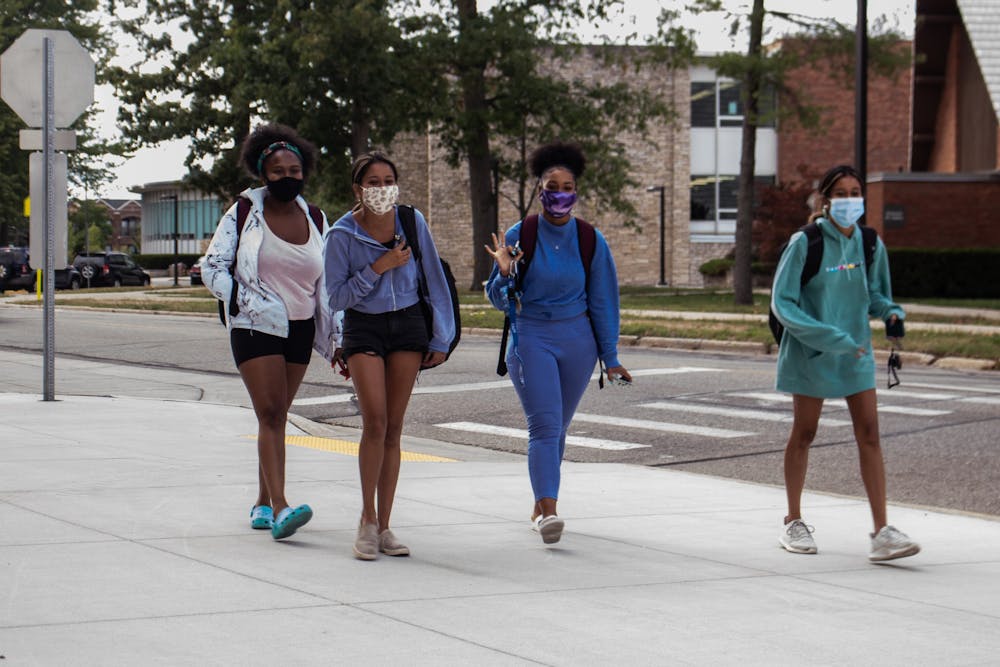Seniors share experiences during the first weeks of their last school year
In seventh grade, Elizabeth Donahue knew she was going to Central Michigan University.
As the last semester of her undergraduate program begins, the Alpena senior said she has a positive outlook overall. However, she's feeling very overwhelmed as she tries to adapt to being back on campus.
“I knew it wasn’t going to be what it could’ve been but this is absolutely not what I was expecting,” Donahue said. “I just hope that I can graduate on time and it's not going to be as detrimental as it feels right now.”
There have been 39 new confirmed COVID-19 cases this week, bringing the total to 181 as of Sept. 4. Currently, 32 of these cases are active. The impact of the rising number of cases leaves seniors making adjustments to preserve as much of their last year before graduating.
Donahue is taking 18 credit hours. She said all of her classes began in the HyFlex format, but now she is partially on an asynchronous schedule.
Asynchronous classes allow Donahue to do her courses on her own time. Donahue said between class lectures and in-class discussions, she has 18 lectures.
“It’s just not feasible for me to do all of it the way that it’s running,” Donahue said.
Donahue said she doesn't blame her professors for inconsistencies and gives them credit for being honest about the uncertainty of this semester.
Warren senior Mackenzie Lukity said during the second week of the semester, she had concerns about going to campus for her classes. She said she’s struggling to navigate her classes with the different variables that come into play.
“I never thought as a senior I’d still be trying to figure out how to go to class and what’s the best way to do my classes,” Lukity said.
Since school has been back in session, CMU officials have been communicating COVID-19 information with students primarily by email. In an email from Associate Vice President for Student Affairs, Tony Voisin shared the nationwide impacts of students gathering at large “weekend parties”.
“The actions of a few selfish students have ruined an entire year for thousands of their peers,” Voisin said in his email. “The same will happen here at CMU if students continue to engage in this type of reckless, irresponsible behavior.”
Donahue said she doesn’t think administrators are setting the example they expect of students.
“They’re actively trying not to shut down and making it the students’ sole responsibility to make sure we stay open,” she said.
Lukity agrees university officials should be the standard of behavior.
“It’s very disheartening for us students who are getting emails every single day about how we need to be responsible and we need to take it into our own hands,” she said. “It’s really making it seem like we’re the only part of the problem, and we’re really not.”
Lukity lives off campus. She said the precautions on campus don't guarantee safety so she finds herself staying home.
“It’s very easy to feel dissociated from a sense of community right now just because of all the safety precautions and limitations we have,” Lukity said. “It’s very hard to feel like a close-knit community when you can’t even be in a room with all of your classmates.”
Coleman senior Matt Fox said he’s reconnected with some of his friends for his fifth year.
However, when the university closed campus during the initial COVID-19 outbreak in March, Fox said some of his friends left and went on to graduate. Similar feelings of uncertainty have carried into this semester.
“It felt like I didn’t get to say goodbye to any of them, we were on spring break so I never really got to see them again,” Fox said. “There’s this kind of dread of ‘will I get to see my friends again?, will I get to see the teachers and professors I want to see again?’ It’s just kind of when rather than if it’ll happen.”
To keep students on campus, the university made plans for on-campus testing two weeks into the fall semester. On Aug. 28, Foust Hall became a COVID-19 testing site. Fox said in order to encourage a safer environment, the university could have had testing available on campus when students initially returned to campus.
However, he said most students are age 17 or older. By this age, he said students should know how their actions might negatively affect a community.
“It’s kind of a two way street of blame here," Fox said. "The university does have a responsibility of testing and making sure it’s a safe environment but at the same time, we’re all adults. We have to make responsible decisions.”




